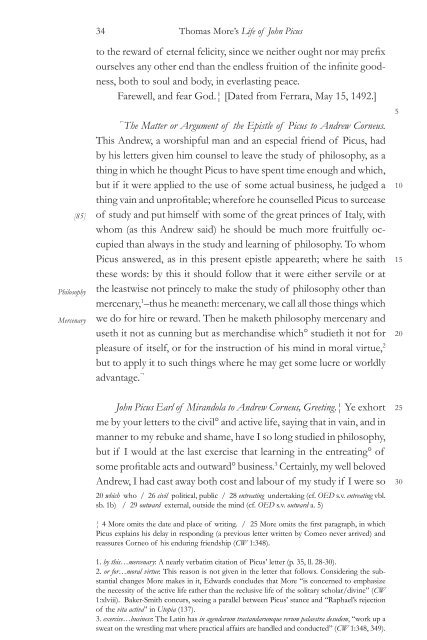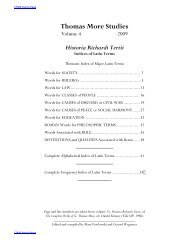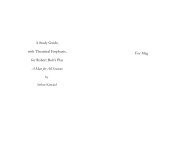life of john picus earl of mirandola - The Center for Thomas More ...
life of john picus earl of mirandola - The Center for Thomas More ...
life of john picus earl of mirandola - The Center for Thomas More ...
You also want an ePaper? Increase the reach of your titles
YUMPU automatically turns print PDFs into web optimized ePapers that Google loves.
[85]<br />
Philosophy<br />
Mercenary<br />
34 <strong>Thomas</strong> <strong>More</strong>’s Life <strong>of</strong> John Picus<br />
to the reward <strong>of</strong> eternal felicity, since we neither ought nor may prefix<br />
ourselves any other end than the endless fruition <strong>of</strong> the infinite goodness,<br />
both to soul and body, in everlasting peace.<br />
Farewell, and fear God.¦ [Dated from Ferrara, May 15, 1492.]<br />
⌐ <strong>The</strong> Matter or Argument <strong>of</strong> the Epistle <strong>of</strong> Picus to Andrew Corneus.<br />
This Andrew, a worshipful man and an especial friend <strong>of</strong> Picus, had<br />
by his letters given him counsel to leave the study <strong>of</strong> philosophy, as a<br />
thing in which he thought Picus to have spent time enough and which,<br />
but if it were applied to the use <strong>of</strong> some actual business, he judged a<br />
thing vain and unpr<strong>of</strong>itable; where<strong>for</strong>e he counselled Picus to surcease<br />
<strong>of</strong> study and put himself with some <strong>of</strong> the great princes <strong>of</strong> Italy, with<br />
whom (as this Andrew said) he should be much more fruitfully occupied<br />
than always in the study and learning <strong>of</strong> philosophy. To whom<br />
Picus answered, as in this present epistle appeareth; where he saith<br />
these words: by this it should follow that it were either servile or at<br />
the leastwise not princely to make the study <strong>of</strong> philosophy other than<br />
mercenary, 1 –thus he meaneth: mercenary, we call all those things which<br />
we do <strong>for</strong> hire or reward. <strong>The</strong>n he maketh philosophy mercenary and<br />
useth it not as cunning but as merchandise which° studieth it not <strong>for</strong><br />
pleasure <strong>of</strong> itself, or <strong>for</strong> the instruction <strong>of</strong> his mind in moral virtue, 2<br />
but to apply it to such things where he may get some lucre or worldly<br />
advantage. ¬<br />
John Picus Earl <strong>of</strong> Mirandola to Andrew Corneus, Greeting.¦ Ye exhort<br />
me by your letters to the civil° and active <strong>life</strong>, saying that in vain, and in<br />
manner to my rebuke and shame, have I so long studied in philosophy,<br />
but if I would at the last exercise that learning in the entreating° <strong>of</strong><br />
some pr<strong>of</strong>itable acts and outward° business. 3 Certainly, my well beloved<br />
Andrew, I had cast away both cost and labour <strong>of</strong> my study if I were so<br />
20 which who / 26 civil political, public / 28 entreating undertaking (cf. OED s.v. entreating vbl.<br />
sb. 1b) / 29 outward external, outside the mind (cf. OED s.v. outward a. 5)<br />
¦ 4 <strong>More</strong> omits the date and place <strong>of</strong> writing. / 25 <strong>More</strong> omits the first paragraph, in which<br />
Picus explains his delay in responding (a previous letter written by Comeo never arrived) and<br />
reassures Corneo <strong>of</strong> his enduring friendship (CW 1:348).<br />
1. by this…mercenary: A n<strong>earl</strong>y verbatim citation <strong>of</strong> Picus’ letter (p. 35, ll. 28-30).<br />
2. or <strong>for</strong>…moral virtue: This reason is not given in the letter that follows. Considering the substantial<br />
changes <strong>More</strong> makes in it, Edwards concludes that <strong>More</strong> “is concerned to emphasize<br />
the necessity <strong>of</strong> the active <strong>life</strong> rather than the reclusive <strong>life</strong> <strong>of</strong> the solitary scholar/divine” (CW<br />
1:xlviii). Baker-Smith concurs, seeing a parallel between Picus’ stance and “Raphael’s rejection<br />
<strong>of</strong> the vita activa” in Utopia (137).<br />
3. exercise…business: <strong>The</strong> Latin has in agendarum tractandarumque rerum palaestra desudem, “work up a<br />
sweat on the wrestling mat where practical affairs are handled and conducted” (CW 1:348, 349).<br />
5<br />
10<br />
15<br />
20<br />
25<br />
30











